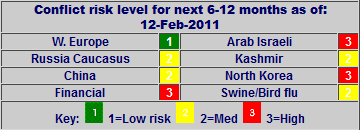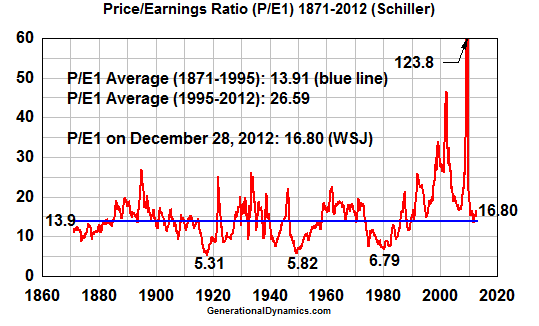
Dynamics

|
Generational Dynamics |
| Forecasting America's Destiny ... and the World's | |
| HOME WEB LOG COUNTRY WIKI COMMENT FORUM DOWNLOADS ABOUT | |
Updating the Global Conflict Risk Assessment graphic
This morning's key headlines from GenerationalDynamics.com
Starting in 2004, I began posting a "Global Conflict Risk" graphic on the Home Page of my web site. It's purpose was to encapsulate the current state of the world, and the likelihood of world conflict. The intention was that the graphic would be updated only rarely, as world events require. The last update was in February, 2011, as follows:
 |
My thinking in 2004 was that there were six regions of the world that had the potential for triggering a world war. Thus, there were important regional wars going on in Sri Lanka, Darfur, Congo, and other places, but these wars were unlikely to spiral into major wars.
On the other hand, I believed that a war in any of the six regions shown in the graphic was likely to spiral into a larger regional conflict, and then possibly to world war. In addition, I felt that a major financial crisis or world flu outbreak would trigger a broad war. Thus, the graphic was indicating my personal assessment of the probability (green=low, yellow=medium, high=red) of a crisis in each of these eight categories during the next 6-12 months, since such a crisis was thought likely to trigger a wider war.
My thinking in 2005 has turned out to be wrong. There have been multiple wars in the six regions, and they have not spiraled into wider wars. (However, we have not yet had a major financial crisis nor a major flu outbreak.)
One of the reasons that my reasoning turned out to be wrong was that I assumed that one of these regional wars would cause other countries to be pulled into the war, causing an uncontrolled spiral. As it turns out, the opposite happened: Other countries rushed in to force a resolution to the war as quickly as possible, so that it wouldn't spiral out of control. In most cases, this "resolution" did nothing to solve the underlying problems, but only "kicked the can down the road" in the familiar way that does the minimum possible to fix the current crisis, leaving the crisis to recur a few weeks or months later.
I'm now updating the Global Conflict Risk graphic to reflect this new thinking. The new graphic is as follows:
 |
I'm keeping the categories the same, but now when I assign a probability of conflict in a region, I'm taking into account my assessment of whether a war in that region is likely to pull in other countries as combatants or as pacifiers.
Let's go through each of the eight categories, and the probability of a regional war that will spiral into a world war:
In 2004, I identified the "Six most dangerous regions in world", and I did a little computation to estimate the probability of a regional war that might spiral into world war, and I came up with a probability of 22% each year. I don't think that computation was particularly valid, but it illustrates the point that in 2004 I expected the worst to be at least a few years in the future.
This year, there are strong signals that the financial crisis and the China threat are imminent. China has almost said as much, as described above.
To pull things together for the 2013 outlook, let's take a look at the following updated graph for the historic S&P 500 Price/Earnings Ratio (also called "stock valuations"):
 |
It's worth pointing out that you see all kinds of historical graphs on CNBC and the other financial media, but you never see a historical graph of the P/E ratio, because anyone who looks at it can see just how dysfunctional the financial system really is. In fact, as we've repeatedly documented, naming names, so-called "experts" lie openly about stock valuations. (See, for example, "14-Apr-12 World View -- Wharton School's Jeremy Siegel is lying about stock valuations" from earlier this year.) In today's world, respectable people are gangsters, and gangsters are treated as respectable people.
As you can see from the above graph, the P/E ratio has returned to the 5-7 level every 31-32 years or so, most recently in 1980. Since reaching a peak value of 123.8 in mid-2009, the ratio has been falling fairly steadily. If you look at the historical flow of the above graph, you can see that the P/E ratio is about to fall sharply, again to the 5-7 level, which would put the Dow at about 3,000.
The stock market has just barely been holding on, thanks to huge amounts of quantitative easing and fiscal stimulus. The Fed and the European Central Bank (ECB) have each injected over a trillion dollars into the banking system in the last year. That liquidity has done nothing for the economy in general, but it's kept the stock market afloat.
Here's how analyst John P. Hussman describes the situation:
"Since 2009, both the stock market and the broad U.S. economy have been dependent on perpetual support from massive federal deficits and unprecedented money creation. Meanwhile, Wall Street is content to ignore the extent of this support, and looks on every movement of the economy as a sign of intrinsic health – which is a lot like admiring the graceful flight of a dead parrot swinging by a string from the ceiling fan."
With China threatening war, and with the global financial system completely dysfunctional, it's possible that the "fiscal cliff" will be the least of America's problems in 2013.
(Comments: For reader comments, questions and discussion, see the 1-Jan-13 World View -- 2013 Forecast: Financial Crisis and China Threat thread of the Generational Dynamics forum. Comments may be
posted anonymously.)
(1-Jan-2013)
Permanent Link
Receive daily World View columns by e-mail
Donate to Generational Dynamics via PayPal
Web Log Summary - 2016
Web Log Summary - 2015
Web Log Summary - 2014
Web Log Summary - 2013
Web Log Summary - 2012
Web Log Summary - 2011
Web Log Summary - 2010
Web Log Summary - 2009
Web Log Summary - 2008
Web Log Summary - 2007
Web Log Summary - 2006
Web Log Summary - 2005
Web Log Summary - 2004
Web Log - December, 2016
Web Log - November, 2016
Web Log - October, 2016
Web Log - September, 2016
Web Log - August, 2016
Web Log - July, 2016
Web Log - June, 2016
Web Log - May, 2016
Web Log - April, 2016
Web Log - March, 2016
Web Log - February, 2016
Web Log - January, 2016
Web Log - December, 2015
Web Log - November, 2015
Web Log - October, 2015
Web Log - September, 2015
Web Log - August, 2015
Web Log - July, 2015
Web Log - June, 2015
Web Log - May, 2015
Web Log - April, 2015
Web Log - March, 2015
Web Log - February, 2015
Web Log - January, 2015
Web Log - December, 2014
Web Log - November, 2014
Web Log - October, 2014
Web Log - September, 2014
Web Log - August, 2014
Web Log - July, 2014
Web Log - June, 2014
Web Log - May, 2014
Web Log - April, 2014
Web Log - March, 2014
Web Log - February, 2014
Web Log - January, 2014
Web Log - December, 2013
Web Log - November, 2013
Web Log - October, 2013
Web Log - September, 2013
Web Log - August, 2013
Web Log - July, 2013
Web Log - June, 2013
Web Log - May, 2013
Web Log - April, 2013
Web Log - March, 2013
Web Log - February, 2013
Web Log - January, 2013
Web Log - December, 2012
Web Log - November, 2012
Web Log - October, 2012
Web Log - September, 2012
Web Log - August, 2012
Web Log - July, 2012
Web Log - June, 2012
Web Log - May, 2012
Web Log - April, 2012
Web Log - March, 2012
Web Log - February, 2012
Web Log - January, 2012
Web Log - December, 2011
Web Log - November, 2011
Web Log - October, 2011
Web Log - September, 2011
Web Log - August, 2011
Web Log - July, 2011
Web Log - June, 2011
Web Log - May, 2011
Web Log - April, 2011
Web Log - March, 2011
Web Log - February, 2011
Web Log - January, 2011
Web Log - December, 2010
Web Log - November, 2010
Web Log - October, 2010
Web Log - September, 2010
Web Log - August, 2010
Web Log - July, 2010
Web Log - June, 2010
Web Log - May, 2010
Web Log - April, 2010
Web Log - March, 2010
Web Log - February, 2010
Web Log - January, 2010
Web Log - December, 2009
Web Log - November, 2009
Web Log - October, 2009
Web Log - September, 2009
Web Log - August, 2009
Web Log - July, 2009
Web Log - June, 2009
Web Log - May, 2009
Web Log - April, 2009
Web Log - March, 2009
Web Log - February, 2009
Web Log - January, 2009
Web Log - December, 2008
Web Log - November, 2008
Web Log - October, 2008
Web Log - September, 2008
Web Log - August, 2008
Web Log - July, 2008
Web Log - June, 2008
Web Log - May, 2008
Web Log - April, 2008
Web Log - March, 2008
Web Log - February, 2008
Web Log - January, 2008
Web Log - December, 2007
Web Log - November, 2007
Web Log - October, 2007
Web Log - September, 2007
Web Log - August, 2007
Web Log - July, 2007
Web Log - June, 2007
Web Log - May, 2007
Web Log - April, 2007
Web Log - March, 2007
Web Log - February, 2007
Web Log - January, 2007
Web Log - December, 2006
Web Log - November, 2006
Web Log - October, 2006
Web Log - September, 2006
Web Log - August, 2006
Web Log - July, 2006
Web Log - June, 2006
Web Log - May, 2006
Web Log - April, 2006
Web Log - March, 2006
Web Log - February, 2006
Web Log - January, 2006
Web Log - December, 2005
Web Log - November, 2005
Web Log - October, 2005
Web Log - September, 2005
Web Log - August, 2005
Web Log - July, 2005
Web Log - June, 2005
Web Log - May, 2005
Web Log - April, 2005
Web Log - March, 2005
Web Log - February, 2005
Web Log - January, 2005
Web Log - December, 2004
Web Log - November, 2004
Web Log - October, 2004
Web Log - September, 2004
Web Log - August, 2004
Web Log - July, 2004
Web Log - June, 2004